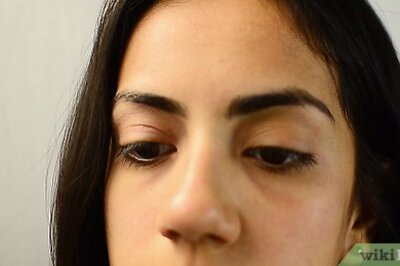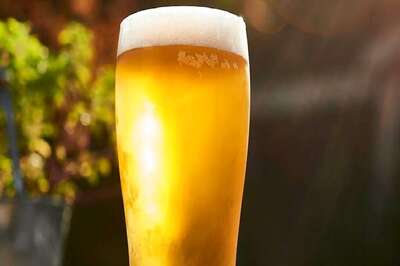
views
Many parts of north India was under the grip of a cold wave with minimum temperatures remaining below the 5 degrees Celsius-mark at several places, while the 40-day harshest winter period, ‘Chillai-Kalan, began in Kashmir on Monday. The 40-day period from December 21 to January 31 is considered the harshest winter period as a cold wave grips the region and the temperature drops considerably leading to the freezing of water bodies as well as the water supply lines in several parts of the valley.
In Delhi, the minimum temperature rose slightly to 5.5 degrees Celsius under the influence of a fresh Western Disturbance affecting the upper reaches of the Himalayas, even as the air quality was recorded in the “very poor” category. The WD will lead to light to moderate snowfall in the upper reaches of Jammu and Kashmir, Ladakh and Himachal Pradesh, weather officials said. The India Meteorological Department said the Safdarjung Observatory recorded a minimum of 5.5 degrees Celsius on Monday morning as against 3.4 degrees Celsius on Sunday, the lowest this season so far.
The maximum temperature settledat 23.5 degrees Celsius, two notches more than normal. It has predicted cold wave conditions at some place in the city from December 23 to December 26, while moderate to dense fog is also likely during the period.
Another Western Disturbanceis likely to affect the upper Himalayan region from December 26, it said. The cold wave prevailed unabated in Punjab and Haryana. Adampur in Punjab recorded the lowest minimum temperature at 3.2 degrees Celsius while Amritsar too reeled under an intense chill, recording a low of 4.8 degrees Celsius.
Minimum temperatures in Faridkot, Gurdaspur and Bathinda settled at 4 degrees Celsius, 6.2 degrees Celsius and 5.2 degrees Celsius, respectively. In Haryana, Ambala experienced a cold night at 3.3 degrees Celsius, while Hisar registered a low of 5.5 degrees Celsius and Narnaul’s recording a minimum of 4.3 degrees Celsius. Fog reduced visibility in the morning at Amritsar, Ludhiana, Patiala, Karnal and Ambala, weather officials said, adding that the severe cold weather conditions are likely to abate in Punjab and Haryana from Tuesday. Further north, ‘Chillai-Kalan’, the 40-day harshest winter period, began in Kashmir on a dry note even as there was improvement in the minimum temperature across the valley.
While ‘Chillai-Kalan’ will end on January 31, the cold wave continues even after that in Kashmir with a 20-day-long ‘Chillai-Khurd’ (small cold) and a 10-day-long ‘Chillai-Bachha’ (baby cold). The night temperature rose across the valley last night owing to a cloud cover, but the minimum still settled below the freezing point, with Srinagar, the summer capital of Jammu and Kashmir, recording a low of minus 4 degrees Celsius, up from the previous night’s minus 6.2 degrees Celsius.
The mercury in Pahalgam tourist resort in south Kashmir improved by over three degrees from the previous night’s low of minus 7.7 degrees Celsius to settle at a low of minus 4.6 degrees Celsius while Gulmarg recorded a low of minus 6.4 degrees Celsius, up from Sunday’s minus 7.5 degrees Celsius. Severe cold waves also swept through isolated places in Uttar Pradesh, with Churk in Sonbhadra district being the coldest place in the state at 3.1 degrees Celsius,.
“The weather was dry over the state. Very dense fog conditions occurred at few places in east UP while severe cold waves prevailed at isolated places over east UP,” weather officials said. The MeT department has predicted cold to severe cold wave at a few places over east UP and cold wave conditions at isolated places over west UP on Tuesday. Meanwhile, a 62-year-old farmer allegedly died due to cold in Uttar Pradesh’s Pachnehi village. “Prima facie it appears that he died due to cold. The body has been sent for postmortem to ascertain the exact cause of death,” hospital authorities said. The minimum temperature increased marginally in parts of Rajasthan even as the mercury dipped below freezing point in Mount Abu where the night temperature was recorded at minus 2 degrees Celsius.
In the plains, Bhilwara was recorded as the coldest place with a minimum temperature of 3.4 degrees Celsius, while Churu, Dabok, Chittogarh, Vanasthali, Pilani, Ganganagar and Sikar recorded a night temperature of 4.7 degrees, 4.8 degrees, 5 degrees, 6 degrees, 6.1 degrees, 6.3 degrees and 6.5 degrees Celsius, respectively. Himachal Pradesh witnessed slight relief from extreme cold wave conditions as the minimum temperature increased by two to three notches in the state in the last 24 hours.
Lahaul-Spiti’s administrative centre Keylong continued to be the coldest place in the state at minus 7.4 degrees Celsius. Kalpa in Kinnaur district recorded a low of 0.8 degrees Celsius. The IMD said cold wave to severe cold Wave conditions are very likely at isolated places over east Uttar Pradesh and Odisha and cold wave conditions at isolated places over Kutch region, Telangana, east Madhya Pradesh, Vidarbha, Chhattisgarh, Bihar, west Uttar Pradesh and gangetic West Bengal. It said cold day to severe cold day conditions are also very likely at a few places over east UP and at isolated places over west UP and cold day conditions at isolated places over Bihar.
Dense to very dense fog is very likely in some pockets over east UP and in isolated pockets over Bihar, it said adding that dense fog is also likely in isolated pockets over Assam, Meghalaya, Punjab and west UP.
Read all the Latest News, Breaking News and Coronavirus News here




















Comments
0 comment